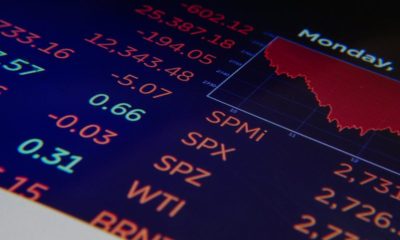Featured
A Great Deflation Will Divide Europe and the U.S., J.P. Morgan
J.P. Morgan analysts have noted an impending deflation. However, they say the impact will be uneven, leaving some countries better off than others. In particular, they note the ongoing energy crisis in Europe will continue to cause inflationary pressure on the continent, while a stronger US dollar is already driving a strong reduction in the prices of imported goods in the States.

Has the time for deflation arrived? The extraordinary rise in prices has scorched the economies of half the world during part of 2021 and 2022. In this period, there were moments of great tension and uncertainty when, despite the optimistic forecasts of central banks, inflation did not cease as it was driven forwards by energy shocks, supply chain problems, input scarcity, and the lack of labor (labor costs). But now, the situation could be changing, although we are still far from declaring victory. However, everything indicates that the inflationary tide may have begun to ebb.
To follow the development of inflation in the USA, Europe, and around the world, download our free business news app.
Are We Headed for a Great Deflation?
Beyond the encouraging inflation data in the US and Canada, several leading indicators (imported prices, producer prices, oil…) reveal that the global economy will begin a new stage known as the great deflation. However, there will be significant geographical differences within this new environment, with some economies much better positioned than others to ‘enjoy’ the cooling of prices.
This does not mean that inflation will go away. Deflation only means that prices will rise at a more restrained pace than in recent months. The CPI will likely still take months or years to return to the 2% zone that the central banks of developed countries are targeting. However, the 9-10% inflation rates seen in recent months could soon be a thing of the past (managers also believe inflation will start to decline).
Just as the US was the first country to experience the inflation shock, it could also be the first to show the most unmistakable signs of this new stage of deflation.
The Great Deflation?
Troy Ludtka, an economist at Natixis, already warned of this scenario a few weeks ago. This expert published a report with fifteen pages full of graphs entitled ‘The Great Deflation?’. Among the graphs, it was possible to notice the substantial increase that inventories have suffered in recent months, the decrease in real disposable income of households (loss of purchasing power of consumers), and the drop in freight rates and oil, among others. All these indicators are consistent with a significant reduction in inflationary pressure at a global level.
A few days later, JP Morgan economists published a report delving into this movement. These experts point out that world inflation has grown at an annual rate of 9.7% in the year’s first half.
But now the tide could be turning, with July reports confirming that the inflation rush is about to end. Last month saw just a 0.3% increase in global CPI, thanks to weakening price pressures of raw materials and essential goods, which is likely to persist.
We expect this downward shift to bring headline inflation in the second half of 2022 below 5%. Although this represents a reduction in the rate of growth of prices by half, the CPI is still growing more than twice as fast as it was before the pandemic.
An Uneven Impact
According to JP Morgan, this deflation will come unevenly and generate a divergent monetary policy response. “We forecast that the largest deflationary impulse will occur in the US, where the CPI will fall to 3% in the last semester, thanks to the greater impact of the decline in raw materials and the reduction of restrictions in the global supply chain, which will be magnified by the strength of the dollar and the drop in wholesale gasoline prices.”
On the other hand, emerging economies should also enjoy significant deflation, partly due to a significant moderation in food price inflation. Although all regions should contribute to this decline, “we anticipate that the EC-4 (Czech Republic, Hungary, Poland, and Romania) will end the year at the top of the global inflation league table with average CPI above 13% in the second half,” JP Morgan analysts predict. Two fundamental forces keeping EC-4 inflation higher (rising natural gas prices and depreciating euro) should also cap any moderation in Western Europe, where JP Morgan expects the CPI to average 7.7% annually.
JP Morgan experts believe that the slowdown in inflation will be based on two recent factors. First, the rapid rise in energy commodities, key drivers of this phenomenon, has started to reverse. Crude oil prices are down 20% from their peak, and FAO food prices are down 11% during June and July. “Our models point to a sharp slowdown in global food inflation to 6% annually in the fourth quarter of 2022 from rising 14.5% in the last quarter.” On the other hand, these experts expect the CPI for energy to stabilize in the coming quarters.
“Second, demand for global goods has fallen in recent months. In addition to tempering pricing power for finished goods, global supply chain constraints have eased. With delivery times shrinking and shipping costs shipment declining, durable goods inflation is likely to slow to half its current pace,” the JP Morgan report said.
The US will move from the bottom of the inflation ranking. Having been the epicenter of this phenomenon that has taken shape in 2021, “it is now ready to see the fastest deflation among the main economies.” The drop in crude oil prices should significantly impact the US CPI.
On the other hand, the US dollar is up around 10% in weighted terms with the rest of the major trading pairs, which already appears to be turning the tide for import prices. Finally, inflation in the US has been driven by a sharp increase in car prices in the last 18 months. Now the price of vehicles seems to have frozen.
Europe Will Continue to Suffer
On the other hand, inflation in Europe will remain relatively high, close to 8%. “While we expect US inflation to fall sharply, Europe faces continued pressure from natural gas price increases. While crude and refined oil products (US gasoline) and farm prices for agricultural products have fallen 15%-20% from their June levels, European natural gas prices (TTF) have risen 143% over the same period,” the authors of the JP Morgan report explain.
Some of the natural gas price increases have yet to be passed through to retail utility prices, and the reduction in the Russian natural gas supply will persist for a considerable time. For all these reasons, “European inflation will remain high for some time, very high. In fact, while we expect the energy CPI in the US to fall by approximately 25% year-on-year in the next three months to September, we expect the energy CPI for the eurozone increases by approximately 15%,” say the analysts of the American bank.
__
(Featured image by Gratisography via Pexels)
DISCLAIMER: This article was written by a third party contributor and does not reflect the opinion of Born2Invest, its management, staff or its associates. Please review our disclaimer for more information.
This article may include forward-looking statements. These forward-looking statements generally are identified by the words “believe,” “project,” “estimate,” “become,” “plan,” “will,” and similar expressions. These forward-looking statements involve known and unknown risks as well as uncertainties, including those discussed in the following cautionary statements and elsewhere in this article and on this site. Although the Company may believe that its expectations are based on reasonable assumptions, the actual results that the Company may achieve may differ materially from any forward-looking statements, which reflect the opinions of the management of the Company only as of the date hereof. Additionally, please make sure to read these important disclosures.
First published in El Economista, a third-party contributor translated and adapted the article from the original. In case of discrepancy, the original will prevail.
Although we made reasonable efforts to provide accurate translations, some parts may be incorrect. Born2Invest assumes no responsibility for errors, omissions or ambiguities in the translations provided on this website. Any person or entity relying on translated content does so at their own risk. Born2Invest is not responsible for losses caused by such reliance on the accuracy or reliability of translated information. If you wish to report an error or inaccuracy in the translation, we encourage you to contact us.

-

 Crowdfunding1 week ago
Crowdfunding1 week agoSpain’s Real Estate Crowdfunding Boom: Opportunity, Access, and Hidden Risks
-

 Fintech4 days ago
Fintech4 days agoDruo Doubles Processed Volume and Targets Global Expansion by 2026
-

 Impact Investing2 weeks ago
Impact Investing2 weeks agoIntesa Sanpaolo’s 2026–2029 Growth and ESG Strategy
-

 Business1 day ago
Business1 day agoTopRanked.io Weekly Affiliate Digest: What’s Hot in Affiliate Marketing [Health Trader Affiliate Program Review]
























